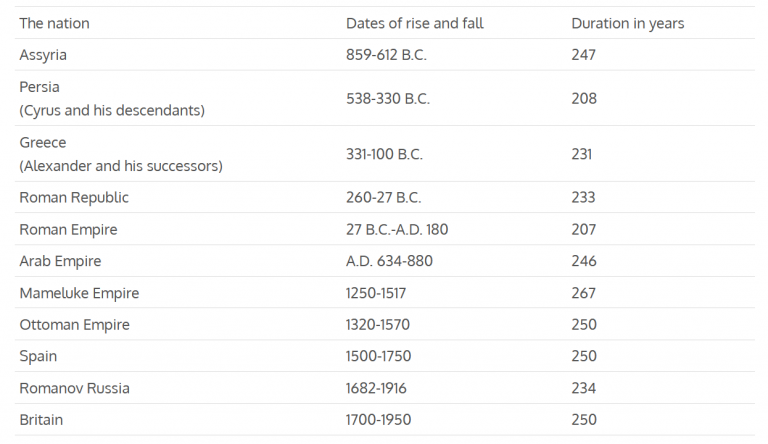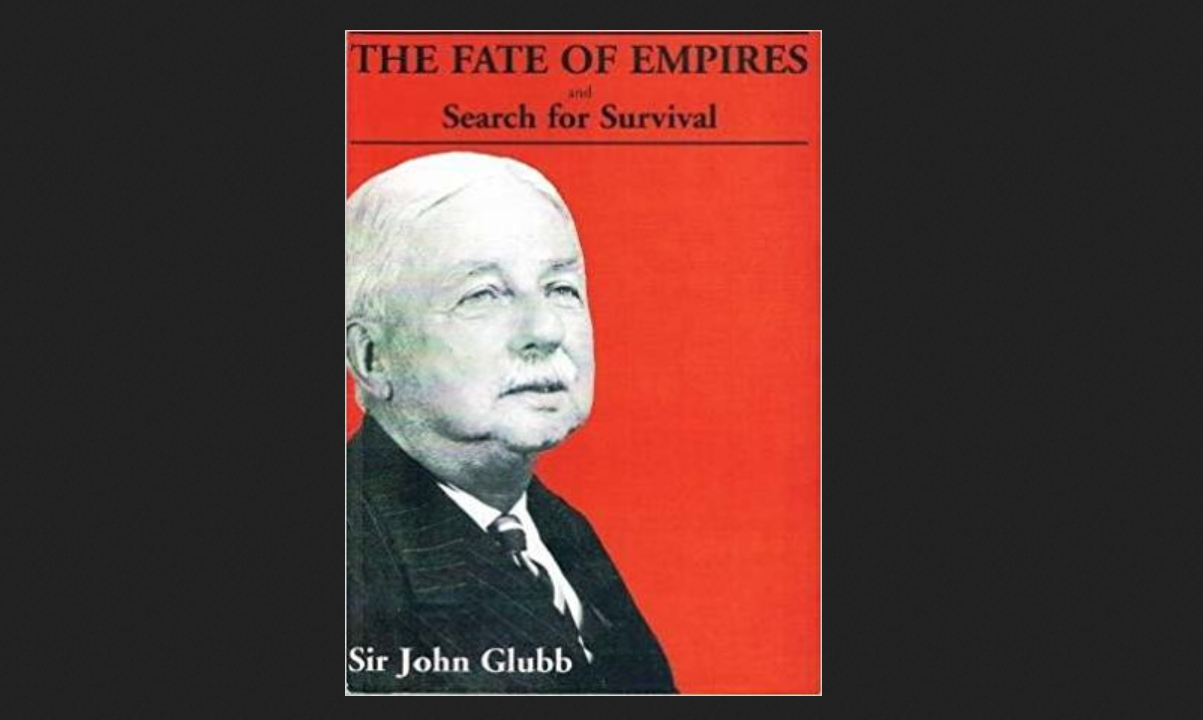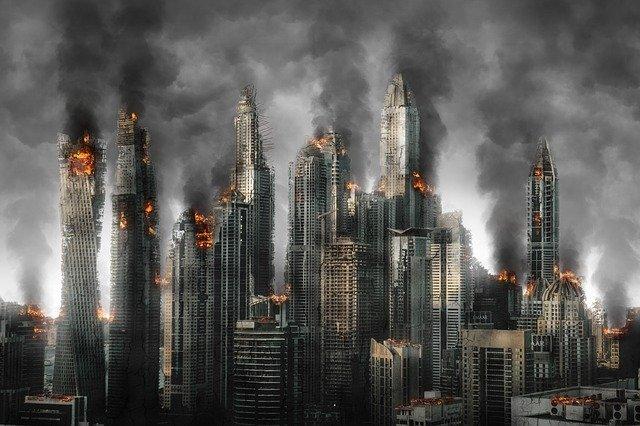Glubb’s Fate of Empires summary
Glubb’s The Fate of Empires is a concise treatise by Sir John Glubb about the rise and fall of many of mankind’s empires.
A few weeks ago, I published an article about Ray Dalio’s Principles for Dealing With a Changing World Order.
In this article, I talked about Ray Dalio’s book and video in which he shows in great detail why the greatest empires of modern history (the Dutch, British and American) rose to become world superpowers, and why they fell – or are falling, in case of the latter.
Ray Dalio’s treatise is amazing, supports the entire premise of my site (the Western world is collapsing and you should get out as soon as possible) and I can completely recommend anyone to read the book or watch the video.
But many decades before Dalio’s work, another man came to very similar conclusions by doing very similar research.
He didn’t have the more recent data Dalio has regarding America, which makes it even more eerie to see just how much of modern history was predicted by Sir John Glubb.
Check out my new book, available on Amazon!
Get the bookWho was Sir John Glubb?
Lieutenant-General Sir John Bagot Glubb was a British soldier who lived from 1897 to 1986.
He served in the first World War, volunteered for service in Iraq and Jordan, and even commanded the Jordan Army.
In addition to his military prowess, and more to the point of this article, he’s published seventeen books, mainly about the Middle East, but one in particular about a broader topic: The Fate of Empires and Search for Survival.
Glubb’s Fate of Empires summary
To summarize Glubb’s Fate of Empire in a sentence:
The empires of the past follow a roughly similar pattern regarding their rise and decline, and we can learn a great deal about how contemporary empires will fare from studying them
Like Ray Dalio, John Glubb looks back many centuries and analyses many empires, starting with the Assyrians around 800 BC, and ending with Britain in 1950.
This covers a period of nearly 3000 years, and there have been approximately 11 great empires on the European continent (including Arabia, Persia and parts of western Asia).
Upon close analysis, the same patterns seem to be constantly repeated, the only differences are climate, location, culture and religion.
Here’s a screenshot of Glubb’s 11 empires, with the approximate dates of their rise and fall, and the length in years:

As you can imagine, an empire usually does not start or end in a specific year, so these are approximations at best.
Usually, the rise and decline follow a very gradual curve, a period where one empire’s rise overlaps with the decline of another.
Despite the differences in technology and the many centuries between some of these empires, it’s rather remarkable how close many of them are in length, as well as in the causes of their decline.
On average, an empire seems to last around 200 to 250 years.
A human generation is about 25 years, so there are 4 per century, which means there are around 8 to 10 generations per empire.
Sometimes an empire exceeds these 200 to 250 years, sometimes it falls short … but on average it’s really rather stunning how close these are to each other in length.
Of course, some do not last nearly as long, like Soviet Russia, but a point could be made that Soviet Russia is still alive and recovering under Tsar Putin.
Like Dalio, Glubb divides an empire’s life span in 3 parts, the rise, the top, and the decline, but he describes them somewhat differently, deeming them to be “Ages”.
The Age of Conquest/Expansion
First, an empire starts with an “outburst”: a nation, often small to begin with, breaks out of its homeland and takes over large parts of the world.
An empire in its “outburst” phase displays a lot of energy, enterprise … and aggression.
This goes for military conquest as well as geographic exploration.
Initiative, courage and hardiness produce a new and formidable nation within a relatively short time frame.
The Age of Commerce/Affluence
This leads to commercial expansion, because an empire can open up free trade within its borders and can more easily trade with neighboring empires due to its status in the world.
The new empire takes over the technology of the empires it replaces, and usually improves upon it.
Vast territories under one government lead to commercial prosperity, which brings about luxury, wealth and the enrichment of commercial classes within the empire.
This wealth brings about funding for the arts, architecture and other “trivial” matters.
In the beginning of this Age, the empire is still strong, because it needs to maintain its income and protect its borders.
Men are still required to be strong and courageous.
However, once enough wealth and prosperity have entered the empire, and the new generations are accustomed to it … the empire enters its decline.
Ultimately, money and the greedy pursuit of it is the cause of the decline.
The Age of Intellect/Decadence
Younger generations no longer crave honor or fame, they are only interested in money, entertainment and other trivial matters.
The empire stops expanding and instead focuses its attention to being defensive, protecting its wealth.
It becomes “civilized”.
Military might is viewed as primitive and wicked.
Pacifism rules the empire … but the problem is that there are plenty of other countries in the world who do not follow this doctrine and are aggressively eyeing the empire.
In this Age, however, remarkable advances in technology and science ensue.
Mankind as a whole progresses … but this doesn’t last.
Progress goes back and forth over the centuries, a bit like the stock market.
Ups and downs, but generally there’s an upward trend.
“Intellectuals” discuss all sorts of topics, and generally produce vast amounts of knowledge.
However, due to all this intellectual debate going back and forth inside an empire, internal rivalries and strife become more prevalent, weakening the empire, dividing its population.
This also leads to the influx of foreigners into the capital cities, which dilutes a nation’s identity and weakens the overall moral fabric of the empire.
(If you read my What causes the collapse of the West? Part 2, you’ll see that I mention the “Mass Immigration of Barbarism” as one of the main 4 factors for the decline of our current Western world.)
Where the hero of the first Age was the explorer or the soldier, the “hero” of the Age of Intellect/Decadence is the athlete, the singer or the actor (or, as we call them now … celebrities).
An empire which used to be strong and united, which valued manly virtues, now hosts an increasingly divided population of selfish and idle people.
Internal strife goes up, the wealth goes down … and the population grows largely lethargic and pessimistic, finding recourse in frivolity, triviality, and mind-numbing substances and occupations.
The decadence which marks this final age is both mental and moral.
The members of an empire cannot escape this decadence, as long as they remain in their old surroundings.
However, if they go somewhere else, their joie de vivre / will to live quickly returns and they find themselves happier and more alive than ever.
This is basically the entire point of escaping the West. Get out of the collapsing world, and go to a nation which is on the rise. It doesn’t need to be a future empire like China, any country which is doing well or will do well in the future will work. Examples are Vietnam, Thailand, Uruguay, Paraguay, the Philippines, Dubai, and so on.
Glubb's Fate of Empires conclusion
Nearly every empire in mankind’s last 3000 years of history (and probably before that too, but we don’t have records) follows a predictable and rather sad pattern of Rise, Peak and Decline.
On average, an empire lasts around 250 years.
The current greatest empire in the world, the United States, celebrates its 250th anniversary in 2026.
If you look at the characteristics of the last phase of the decline, the Age of Intellect/Decadence, it’s pretty obvious the Western world is in this stage right now.
Glubb describes it as such:
Decadence is a moral and spiritual disease, resulting from too long a period of wealth and power, producing cynicism, decline of religion, pessimism and frivolity. The citizens of such a nation will no longer make an effort to save themselves, because they are not convinced that anything in life is
worth saving.
If you look at what’s going on for the last few years, the cynicism, internal strife, adoration of celebrities, vacuous entertainment and other decadent behavior, we can predict what the future will bring.
The Western world is collapsing, and it’s only a matter of time before it does so completely.
How this will play out, and why it does so, are things I’ve discussed in previous articles.
All in all, Glubb’s Fate of Empires is a very interesting and short read, which I can wholeheartedly recommend to anyone interested in this material.
You can read it here for free. It’s only 26 pages long, so why not?
Check out my new book, available on Amazon!
Get the book


